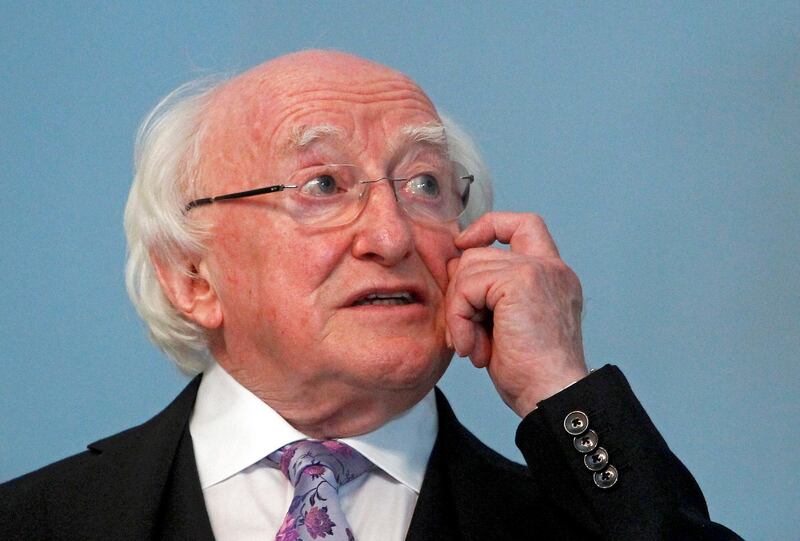When Ireland announces the results of its presidential election later today, it will be to nobody’s surprise that the sitting leader has been returned for a second seven-year term.
Michael D Higgins is an admirable steward of the nation. A poet and veteran of left-leaning politics, he has acted as the country's conscience as it rebuilt from the disasters of the 2008 financial crisis.
He crushed a varied field of challengers, most notable for the three contenders who had risen to fame in the Irish version of Dragons Den.
There was one issue in the campaign that was left unresolved − the crisis of not providing enough liveable homes for its people. Mr Higgins is of very short of stature, at just 1.63 metres. One comedian joked in the final week that the country was going wrong when people voted for the country’s smallest man to live in its biggest house.
Áras an Uachtaráin, the official residence, is an almost 100-room palace set in the middle of parkland in central Dublin.
More than any other, homelessness and the lack of affordable properties is the nagging sore in politics, not just in Ireland but across Europe.
The Irish president holds the powers once held by the British monarch, so Mr Higgins could do little himself to directly address the problem. It is certainly worsening. One number in the headlines in Ireland is the estimate of 3,829 children living in temporary accommodation. The obvious inequity of being born into homelessness has been at the heart of the anguished national debate.
Separate to the election, the Dublin government took a stand against Airbnb and other short-term letting platforms. Last week, it outlined new rules to restrict listings to people’s primary homes. Second homes or holiday properties would be cut out.
One roadside banner I spotted in a coastal region on the day of the announcement made clear the anger at lucrative short lettings that disadvantage locals: “200,000 holiday houses empty yet 10,000 homeless can’t be right.”
Barcelona has already moved to restrictively licence Airbnb-style lettings. Berlin, like Barcelona, has expanded teams of housing inspectors to find and stop illegal landlords exploiting the platform.
The flaws in existing rental markets offers only a partial picture of what's gone wrong. In Ireland, the 2008 crash produced a phenomenon of ghost property developments that had been abandoned by bankrupt developers. Now that property prices are recording double-digit annual rises again, new pressures on homeowners stem from a lack of affordability.
Yet a much-touted political war on the bureaucratic hurdles to building more properties never seems to bear fruit. This is true in neighbouring Britain, where it was revealed last week that the largest development companies were sitting on land that could provide 130,000 homes.
In response to the pressures, European leaders have also reached for tax tools to try to force change in the market.
One assessment of President Emmanuel Macron’s tax policy is that he seeks to extract maximum revenues from assets that are static or fixed, like property, to create the resources to free up more dynamic earnings-related revenues.
Britain has responded to high-profile exposés of empty apartment tower blocks lining the River Thames by imposing a series of levies and duties that target overseas buyers. Coming amid the uncertainty of Brexit, this squeeze by the taxman looks to have been horrendously ill-timed.
Property prices in London have dropped as buyers lose the zeal that kept a frothy bubble going. The windfall taxes the government foresaw are now looking like a mirage.
It is hard to escape the feeling that politicians are getting the problem totally wrong. It is not a matter of curbs on rental platforms or penalising taxes to make buyers and landlords change behaviour or get out of the game.
The questioning of the model of property sales and leasing, which has evolved in many countries over decades, is wholesale. The 2008 crash followed by the asset inflation under quantitative easing in America, the Eurozone and Britain has senselessly disenfranchised too many.
That is why a radical reinvention of housing is on the cards. This is likely to be state-led across Europe. The founding idea, an old one, is that homes should be available for those who need them. Utilising land will replace the supremacy of investment opportunities.
Having won his election, Mr Higgins would be well advised to make housing a theme. His life-long reputation for authenticity remains unrivalled in Irish politics.
It would be too much of a stunt to urge Mr Higgins to open up some of his many rooms to those seeking shelter. However, the seven years ahead will be shaped by how the battle of homelessness is overcome. And not just in Ireland.





